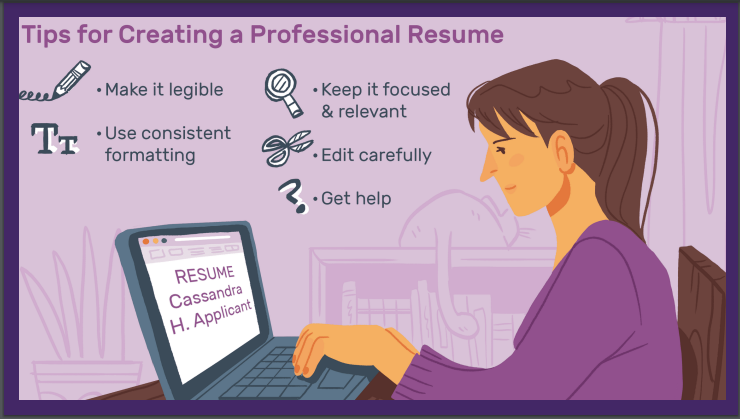A solid resume and a well-written cover letter are essential components of a successful job search and higher education. These papers are essential for employers and institute to understand who you are, what inspires you, and what you can bring to the table as a possible employee.
Knowing how to construct a resume can help you stand out from the crowd and get on the shortlist for an interview. Your CV must show that you meet the majority, if not all, of the job’s requirements. Customize your resume for each position you apply for by emphasizing relevant work experience and removing irrelevant information.
Advantages Good resume
Consider your CV to be your own live, breathing personal pitch – one that simply addresses all of a recruiter’s or hiring manager’s queries about you. Whether or not you are asked to an interview depends on how well you offer the reader with the information they need to make an educated choice. This should contain why you are looking for this position, with this company, and in this sector, what value you can provide to the company, and whether you have the qualifications to succeed in the role.You must produce a solid CV that clearly expresses this information to leave no mistake in the reader’s mind about your suitability.
Goals of Resume
Your resume is used to show a recruiter or future employer how relevant your skills, experience, credentials, and achievements are. Because a recruiter or employer may only have a few minutes to study your CV, it should concisely express your most relevant accomplishments. Your CV will have served its objective if the reader believes you are a good fit for the job. an invitation to an interview
Step by step Tips for writing a great resume
- Contact Information
Begin with the basics: your name, phone number, email address (make sure it seems professional), and LinkedIn profile link (once live, connect to the ‘LinkedIn profile checklist’ page). Use your most frequently used phone number and email address. You don’t want to let an employer down by failing to react to an interview invitation in a timely manner
2. Professional Summary
Describe your relevant experience and talents in 50 to 150 words. This summary should demonstrate your worth and help you stand out. Instead of articulating what you want from your future employment, concentrate on what you can provide. This is where you should put your USP (unique selling proposition)
3. Skills summary
Because the reader of your resume may only have a minute to check each application, especially if the volume is large, incorporating a skills section might attract their attention by making it apparent what you can provide right away. Make a bulleted list of the most relevant systems, abilities, and competences for the position you’re looking for. Use keywords from the job description in this section as well.
4. Achievements
A potential employer will be interested in instances where you went above and beyond the job description and accomplished something extraordinary. So, next, make a list of your most important professional accomplishments, backed up with facts, data, or links. If you exceeded your sales objectives by a certain % and during a certain time period, for example, you must state how much and when.
5. Work Experience
The most extensive component of your resume should be your job history, with positions presented in reverse chronological order, beginning with the most recent. Include the names of the employers, their positions, and their principal tasks.
It is critical to quantify your achievements; the reader is looking for facts, not fluff. Instead of merely stating your responsibilities, concentrate on the value you brought in each job. This section should not be written in the style of a job description. Rather, it should convey the tale of your distinct abilities and achievements. Consider your most significant accomplishments in each capacity and present solid, verifiable proof for each. Using action verbs like “controlled” or “oversaw” might help you do this.
Such verbs force you to focus on what you achieved and your results in each role, which proves the value of your experience.
6. Education & qualifications
Keep it concise by listing the academic qualification obtained, year of completion, the institution’s name and a one-sentence summary.
7. References
The details of references are rarely included on resumes. It’s common for candidates to simply write, “References are available upon request” in this section of your resume. Your recruiter will then reach out for the details of your referees at the appropriate point in the recruitment process.
Remember though, the referees recruiters and employers value the most are those people you reported to directly who can speak about how you used your skills and experience to add value to their organization. If you are unsure who to provide as a referee, our guide to references may help.





More Stories
Merit Scholarships in Universities across the country
Interest Free Loans Schemes in Pakistan for Students
Selected Students Lists